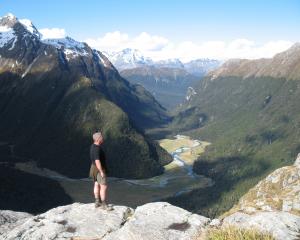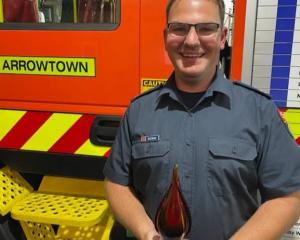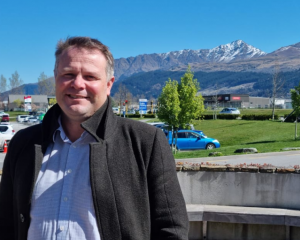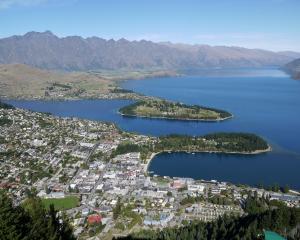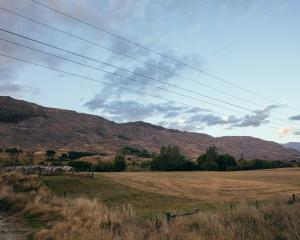LandSAR Wanaka is among the best-equipped search and rescue organisations in the country and has a new headquarters. This is largely due to the business skills of a former global news executive who has made Wanaka home. ODT reporter Jessica Maddock talks to Phil Melchior, whose new book on high country search and rescue details some of the voluntary group's extraordinary missions.
''Phil Melchior is the type of person who leaves an indelible impression on the people he meets. One that, on reflection, leaves you with a feeling that you're a better person for the experience.''
That is how Wanaka police search and rescue co-ordinator Sergeant Aaron Nicholson describes LandSAR Wanaka volunteer Phil Melchior - a former international media executive who fellow volunteers say can take a lot of credit for the readiness, professionalism and success of the search and rescue organisation, considered to be one of the country's finest.
Mr Melchior's fundraising and negotiating skills and connections means the group has high-quality rescue equipment, housed in a dedicated headquarters.
He also has the mountaineering skills to be a very useful rescuer, taking part in some of the organisation's most difficult operations.
''He's decisive, clear-thinking, you can trust him and he's good company ... he will help you in any way he can. There's no limitations on what he's prepared to do for you ... it's hard to know what to say about a guy like him,'' bush team leader Brent Arthur of Lake Hawea said.
And, despite battling a rare illness over the past three years, from which he was not expected to recover, Mr Melchior (66) keeps giving to LandSAR.
He has written a book detailing 11 rescues - a gripping read, filled with real-life drama, elation and tragedy.
''I was about to start four months of chemo. It stopped me sitting around feeling sorry for myself.''
Mountain Rescue - epic tales of search and rescue in high-country New Zealand goes on sale next Friday and proceeds will go to LandSAR Wanaka.
Mr Melchior said he ''never in a million years would have volunteered for search and rescue. I never thought I had anything to offer''.
Learning of his management experience - which included five years as Reuters' London-based global managing director - Sgt Nicholson recruited him as the group's fundraiser in 2004.
He went on to serve for six years on LandSAR's national board, including four as chairman.
''It's my personal observation that LandSAR NZ made its biggest gains, in terms of direction and structure, during his tenure in a leadership role,'' Sgt Nicholson said.
One chapter of the book details the extraordinary rescue of Otago teenager Dion Latta, who spent three hours upside down in a waterfall in the Motatapu Gorge near Wanaka.
Despite what Mr Melchior describes as a ''humongous'' rescue effort, Dion died from hypothermia the following day.
How do volunteer search and rescuers cope with such horror?
''Different people deal with it in different ways,'' Mr Melchior said.
''The number of people who see the sharp end of it is probably relatively small. Gary Dickson has picked up more dead people than anybody else and it certainly started to impact on him after a while.
"Davie Robinson always ... talks to the person as though they were still alive. He feels it shows respect and makes it easier for him.''
With a journalism career spanning three decades and three continents, Mr Melchior had already seen his fair share of trauma, tragedy and grief.
His career started in sleepy Wairoa in 1969 and soon took him to England and various parts of Asia.
He reported history's deadliest peacetime maritime disaster, a Philippines ferry sinking in 1987, in which nearly 4400 people died and just 24 survived.
''I remember all those bodies washing up on the shore ... 1km absolutely littered.''
Other memorable stories included covering the Mr Asia trial in England and the Rainbow Warrior sinking, which Mr Melchior said came as a real shock, even to a veteran political reporter.
''I was having lunch with a senior person from Foreign Affairs on the day it happened. She said to me `I wouldn't put it past the French Government' and I said `you must be joking; why would they do something so stupid'.''
Three years after celebrating his 60th birthday by climbing Mt Cook, Mr Melchior's biggest challenge was forced on him. Seeking medical advice on breathlessness in 2012, he was diagnosed with amyloidosis.
Affecting just five people in a million, the rare blood disorder attacks an organ - in Mr Melchior's case, his heart.
''It was like wrapping the heart in Gladwrap. It started to stifle.''
He was given six to nine months to live and told 95% of other sufferers had died within two years.
But Mr Melchior received ''cutting edge'' treatment, which had only been developed in the previous two years and just approved by Pharmac, at Auckland Hospital.
''An awful lot of my energy in the last three years has gone on trying not to die, basically, which, touch wood, I have managed quite successfully.''
Mr Melchior talks of his gratitude to people who have been rescued by LandSAR, or are related to victims, for their ''incredible openness'' when he was writing his book.
He is no different.
He talks strongly and calmly about the turn his life took during that doctor's visit.
Only when his wife of 44 years, Barbara, is mentioned does emotion threaten to overflow.
''I cannot be convinced these things aren't harder on the people who love you, and who you love, than they are on yourself.
''For you, it's kind of like climbing a mountain - you focus entirely on doing whatever you can to try and beat the thing ... if the worst comes to the worst, for you it's over. For them, life goes on and goes on differently.''
But it appears Mr Melchior's body is now absorbing the bone marrow protein which caused the illness, as most people's bodies do.
''There's a general expectation that it will come back, but at the moment I am doing great. I will worry about it if and when the time comes.
''I've had my third birthday since I was told I wouldn't have any more.''
• Phil Melchior's book, Mountain Rescue - epic tales of search and rescue in high-country New Zealand, will be released on July 31. Proceeds to LandSAR Wanaka


